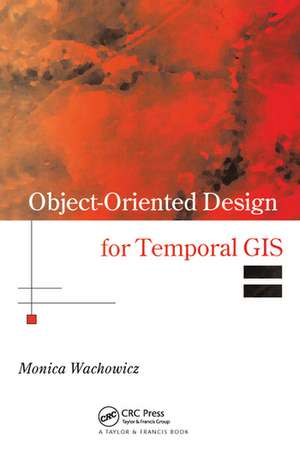Object-Oriented Design for Temporal GIS: Research Monographs in GIS
Autor Monica Wachowiczen Limba Engleză Paperback – 30 iun 2020
Object-Oriented Design for Temporal GIS explores the major components of the object-oriented analysis and design methods, how they can be used for modelling spatio-temporal data, and how these components are developed and maintained within a GIS. It also offers practical guidance to object-oriented methods by demonstrating the feasibility of applying such methods to issues involved in handling spatio-temporal data. The author demonstrates how this knowledge might be used in a wide range of applications such as political boundary record maintenance (historical data), disease incidence rate analysis in epidemics (diffusion rate), and environmental studies of climate change (time-series data). This understanding contributes to the development of theory in GIS and improves the design of GIS to support the modelling of semantics, space and time elements of geographical information.
Preț: 308.15 lei
Preț vechi: 377.10 lei
-18% Nou
Puncte Express: 462
Preț estimativ în valută:
58.98€ • 64.09$ • 49.58£
58.98€ • 64.09$ • 49.58£
Carte tipărită la comandă
Livrare economică 21 aprilie-05 mai
Preluare comenzi: 021 569.72.76
Specificații
ISBN-13: 9780367579173
ISBN-10: 0367579170
Pagini: 132
Dimensiuni: 152 x 229 mm
Greutate: 0.25 kg
Ediția:1
Editura: CRC Press
Colecția CRC Press
Seria Research Monographs in GIS
ISBN-10: 0367579170
Pagini: 132
Dimensiuni: 152 x 229 mm
Greutate: 0.25 kg
Ediția:1
Editura: CRC Press
Colecția CRC Press
Seria Research Monographs in GIS
Public țintă
ProfessionalCuprins
There has been an increasing demand in GIS for systems that support historical data: time-series data as well as mobility information. From a modelling perspective, there are advantages in integrating object-oriented analysis and design to databases as well as to visualisation capabilities of GIS.Object-Oriented Design for Temporal GIS explores the major components of the object-oriented analysis and design methods, how they can be used for modelling spatio-temporal data, and how these components are developed and maintained within a GIS. It also offers practical guidance to object-oriented methods by demonstrating the feasibility of applying such methods to issues involved in handling spatio-temporal data. The author demonstrates how this knowledge might be used in a wide range of applications such as political boundary record maintenance (historical data), disease incidence rate analysis in epidemics (diffusion rate), and environmental studies of climate change (time-series data). This understanding contributes to the development of theory in GIS and improves the design of GIS to support the modelling of semantics, space and time elements of geographical information.
Descriere
Object-Oriented Design for Temporal GIS explores the major components of the object-oriented analysis and design methods, how they can be used for modelling spatio-temporal data, and how these components are developed and maintained within a GIS.



